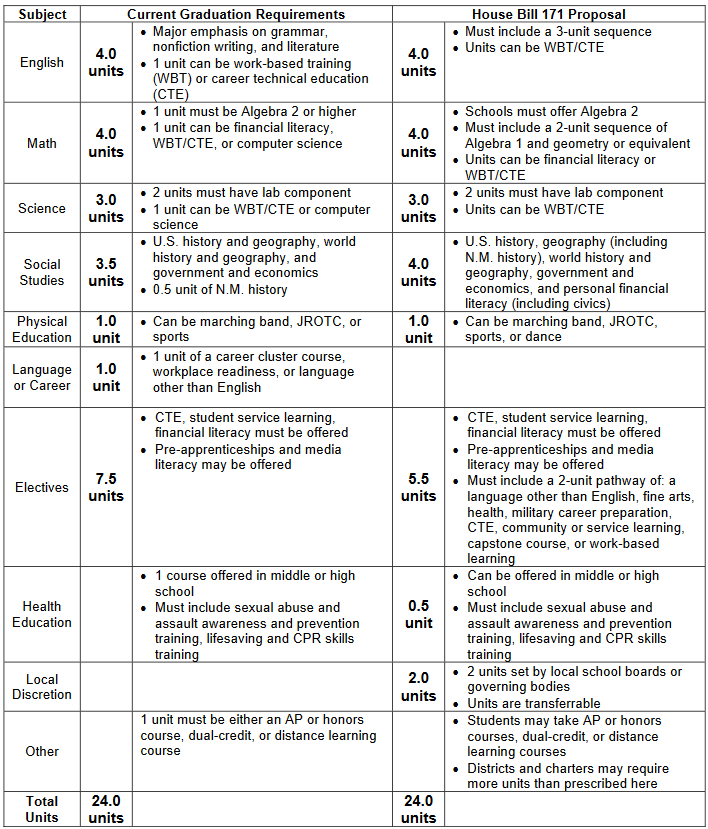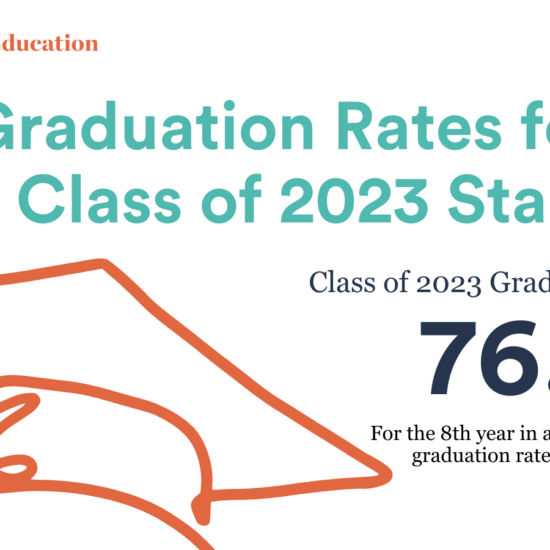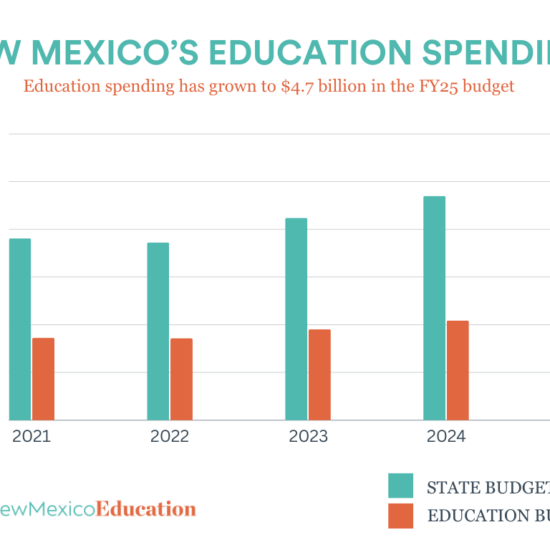
New Mexico passed a new law, House Bill 171, a comprehensive overhaul of high school graduation requirements aimed at modernizing curriculum standards and providing greater flexibility for students.
The bill – signed into law by Governor Michelle Lujan Grisham on February 9 – represents a significant departure from previous graduation criteria and reflects a bipartisan collaborative effort between legislators, education officials, and the governor’s office.
The legislation was sponsored by bipartisan legislators State Representatives G. Andres Romero (D – Bernalillo) who chairs the Legislative Education Study Committee, Rep Ryan Lane (R – San Juan) the Republican leader in the state House of Representatives, and Senator Mimi Stewart (D – Bernalillo) who serves as President Pro Tempore of the state Senate.
This bill comes after a year of deliberation and refinement following the governor’s veto of a similar bill last year. According to Senator Mimi Stewart, who spearheaded the effort, extensive revisions were made in consultation with the governor and the Public Education Department to address concerns and fine-tune the bill.
The bill eliminates requirements for Algebra II, advanced placement, honors, and dual credit courses, which were previously mandatory for graduation. Instead, the legislation emphasizes flexibility by allowing students to choose from a broader range of courses, including those in Career Technical Education, internships, or project-based learning.
However, the debate over the inclusion of a standalone financial literacy course sparked contention among lawmakers in both chambers.
What Does this Change?
Graduation requirements will be changed for students who begin high school in the 2025-2026 school year.

Flexibility in Course Offerings
Each local education agency (LEA) will select two credits to be required by the district, in addition to the requirements outlined in the law, to complete a student’s graduation requirements. This means each of New Mexico’s 89 school districts could have different graduation requirements.
Emphasis on Career Technical Education (CTE)
Electives in Career Technical Education, internships, or project-based classes will count towards core requirements, promoting practical skill development and career readiness.
Algebra II No Longer Mandatory
While Algebra II will still be offered in all high schools, it will no longer be a mandatory requirement for graduation. Students opting out must substitute it with another math class.
Emphasis on Financial Literacy
Financial literacy education will now be required to be offered in every high school, providing students with the opportunity to take a standalone course as one of their math credits.
Removal of Certain Course Requirements
The bill eliminates the requirement for students to take at least one Advanced Placement, honors, dual credit, or distance learning classes.
Maintenance of Total Credit Requirement
Despite the changes, the total number of credits required for graduation remains at 24, ensuring consistency in academic expectations.
Debating the Requirements
In the House of Representatives, members engaged in a debate over the inclusion of a standalone financial literacy course in the bill on February 1. Representative Tanya Mirabal Moya emphasized the need for local communities to determine the educational needs of their students. “The people in that community are the ones that need to determine what their students need to succeed,” she asserted.
However, concerns about financial literacy persisted among some lawmakers. Representative Candy Spence Ezzell voiced apprehension about the lack of financial education provided to students. “I am concerned that we are not teaching children the entire aspect of what’s going to happen to them once they get out of high school,” she expressed.
In response, Representative G. Andres Romero, a sponsor of the bill, highlighted the existing standards for financial literacy education and stressed the importance of local implementation. “It’s definitely required, it is very important and it is reflected in the bill,” he clarified.
Despite differing opinions, the House ultimately passed the bill with a vote of 57-1.
The lone dissenting vote came from Representative Marian Matthews (D – Bernalillo), she argued that the bill did not go far enough in ensuring students go through financial literacy. “I just think it’s imperative that financial literacy be a required course so we can help these young people prepare for life,” she said after recounting a story of a 20 year old woman who was never taught about credit or debt, and managed to create over $50,000 in debt because they were unaware of the consequences of credit.
The debate continued in the Senate on February 7, where senators deliberated on the bill’s implications for student achievement and workforce readiness. Senator Mimi Stewart commended the collaborative effort to refine the legislation, emphasizing its potential to better align high school curriculum with evolving workforce needs.
However, the question of financial literacy resurfaced during Senate deliberations, leading to an amendment attempt. Senator Martin Hickey proposed the Senate should include a standalone financial literacy course, arguing that this is an important skill to prepare New Mexican students for financial responsibility.
In contrast, Soules explained the existing standards for financial literacy education and highlighted the bill’s emphasis on flexibility. “Every student, 100 percent of them will be getting financial literacy through this program,” he asserted.
After debate, the Senate rejected the amendment and passed the bill with overwhelming support, 40-0.
The governor signed the bill into law on Feb. 9.







